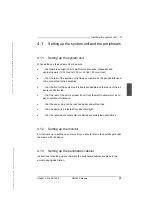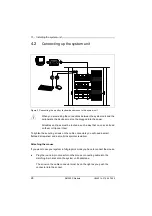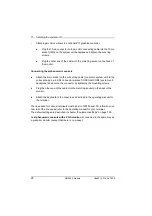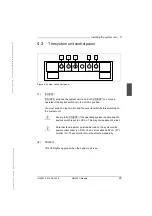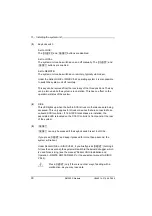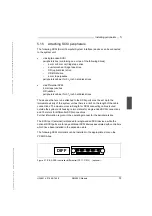
Installing peripherals
5
U24801-J-Z146-2-7600
RM300 C Models
37
D
o
k
u
s
c
h
abl
on
en V
e
rs
io
n
3
.2
v
om
2
5
.10.
9
3
©
S
ie
m
en
s
N
ix
d
o
rf
I
n
fo
rm
a
ti
o
ns
s
y
s
te
m
e A
G
199
3
Dr
u
c
k
v
o
m
12
.
0
4
.1
9
99 15
:5
0.
37
P
fad:
H:
\C
h
ri
s
to
p
h
\M
anu
al
e\
P
D
F
\R
M
\R
M
3
00C
B
e
tr
iebs
an
le
it
ung
\eng
lis
c
h
\r
m
3
00.
k
0
5
5.1
Attaching peripherals
Once you have installed your system unit and your monitor, you can start attaching
the peripherals.
To tighten the securing screws on the cable connectors you will need a small
flathead screwdriver and a small crosspoint screwdriver.
When you are making the connections between the system unit and the
peripherals, the system unit must be off and devices must not be plugged
into the power.
The system unit, the monitor and the peripherals must all be set to the
correct line voltage.
All cables and lines must be routed in such a way that no-one can tread
on them or trip over them.
You must use shielded connecting cables to attach your peripherals to the
system unit.
The system unit and the peripherals must all be connected to the same
distribution board to prevent the flow of compensating currents.
If this is not possible, a transmission method for differing distribution
boards must be used, even for short distances.
If the above connection conditions are not fulfilled, data transmission malfunctions
and damage to the equipment may result.
!
Summary of Contents for RM300 C20
Page 1: ...Edition March 1997 RM300 C Models Operating Manual Reliant UNIX SINIX ...
Page 4: ......
Page 5: ...Equipment care Technical data Equipment settings Accessories Reference section and Index ...
Page 6: ......
Page 198: ......
Page 200: ......
Page 202: ......
Page 204: ......



